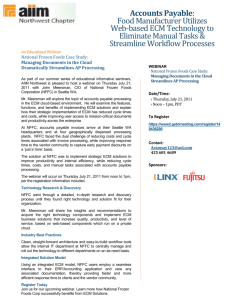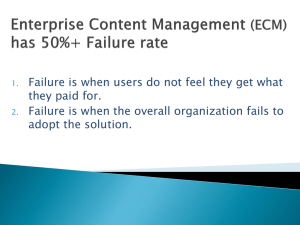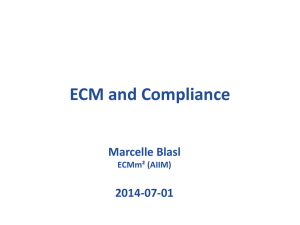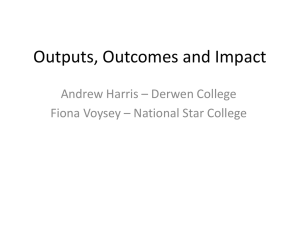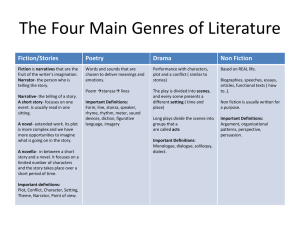Fact or Fiction?
advertisement
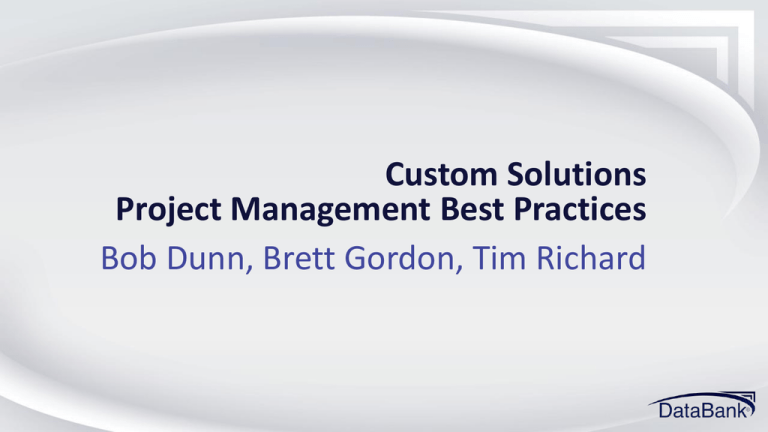
Custom Solutions Project Management Best Practices Bob Dunn, Brett Gordon, Tim Richard Agenda • Project Management – Fact or Fiction • The Top 5 Facts about Managing Projects – Breaking Down the Project Phases • Best Practice Summary • Open Discussion – Real Life Solutions 2013 ECM Training Conference #dbwestECM Fact or Fiction? Successful projects require a dedicated Project Manager who will own the project? 2013 ECM Training Conference #dbwestECM Fact or Fiction? Answer: Fiction Successful projects require buy-in and ownership from all applicable levels Assign a Project Team 2013 ECM Training Conference #dbwestECM Fact or Fiction? Projects are easy to manage if you have a designated Project Team? 2013 ECM Training Conference #dbwestECM Fact or Fiction? Answer: Fiction Project success is directly tied to having the right people assigned to the Project Team. Assign the right team. 2013 ECM Training Conference #dbwestECM Fact or Fiction? Having the right Project Team assures success? 2013 ECM Training Conference #dbwestECM Fact or Fiction? Answer: Fiction Having the right team is just a start. You have to have solid communication and organization Stay organized and establish timelines 2013 ECM Training Conference #dbwestECM Fact or Fiction? Setting deadlines is critical to project success? 2013 ECM Training Conference #dbwestECM Fact or Fiction? Answer: Fiction Managing perceptions and setting “realistic” deadlines is the key to project success 2013 ECM Training Conference #dbwestECM 2013 ECM Training Conference #dbwestECM The Top 5 Facts about Managing Projects 1. Successful Projects require buy in from all levels, including upper management 2. Project Requirements/Expectations need to be clearly defined from the very beginning 3. Formal Discovery is “not” optional, it is required 4. Documentation is Key 5. You cannot have too much Communication 2013 ECM Training Conference #dbwestECM Breaking Down the Facts Upper Successful Projects Mgt. require buy in from all levels Vendor Planning Phase 2013 ECM Training Conference IT Project End Users #dbwestECM Breaking Down the Facts Project Requirements and Expectations need to be clearly defined Pre-Discovery Phase 2013 ECM Training Conference • • • • • • • • Require and obtain a Solution Requirements Document Define Project Team Perform Pre-Discovery to discuss requirements Create a Statement of Work with budget estimates Obtain budget approval Discuss and agree on realistic project expectations Discuss and set realistic Timelines Schedule Formal Discovery #dbwestECM Breaking Down the Facts • Formal Discovery is “not” optional, it is required Discovery Phase 2013 ECM Training Conference • Schedule appropriate discovery time based on the Pre-Discovery Phase outcome Perform formal solution discovery – Tag Team discovery by having two OnBase experts • One leads the discovery and the other documents requirements • Review “As Is” process – Identify and document bottlenecks, issues, and concerns • Review “To Be” process – Identify and document requirements, gaps, and assumptions #dbwestECM Breaking Down the Facts Documentation is Key Discovery Phase 2013 ECM Training Conference • Create a detailed Functional Design Document defining the “to Be” solution you are proposing • Create a Statement of Work that includes requirements, expectations, assumptions, and a breakdown of project costs • Obtain sign-off of documentation prior to development #dbwestECM Breaking Down the Facts • Build to Specifications Deployment Phase 2013 ECM Training Conference • • • • • • Develop the solution per the signed documentation – do not stray from it Build a “Proof of Concept” of the solution and present it for approval Prepare Use Cases for Testing and Training purposes Train the defined UAT Group Require UA testers to document issues in an “Open Issues” spreadsheet during UAT Utilize a formal Change Order process for managing change requests that fall outside the project scope Require formal sign-off prior to pushing the solution into production #dbwestECM Breaking Down the Facts Transition to Support Mode PostDeployment Phase 2013 ECM Training Conference • Make sure all Functional Documentation is up to date and reflects the final developed solution • Hold a formal transition meeting with the OnBase Administration team if you are not that person – Include the Vendor if they developed the solution – Transition the project from “Active” to “Support Mode” – Close out the project #dbwestECM Best Practices Summary • Planning Phase – Buy-in is not optional, it is required • Pre-Discovery Phase – Don’t Ignore it • Discovery Phase – Most critical phase • Deployment Phase – Stick to the plan • Post Deployment – Complete the transition 2013 ECM Training Conference #dbwestECM Open Discussion Real Life Solutions 2013 ECM Training Conference #dbwestECM Open Discussion 2013 ECM Training Conference #dbwestECM

